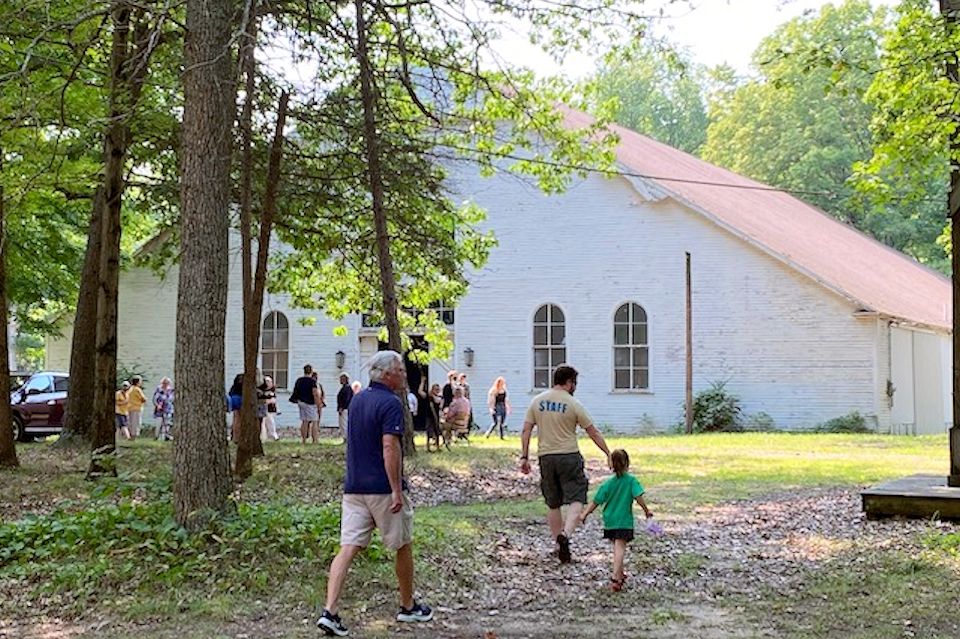Life-changing decisions have been made at Crystal Springs for 160 years. Now, as the Pokagon Band develops the site, the Creator remains present, sharing “lessons in every leaf and rock.”
KAY DEMOSS
Senior Content Editor
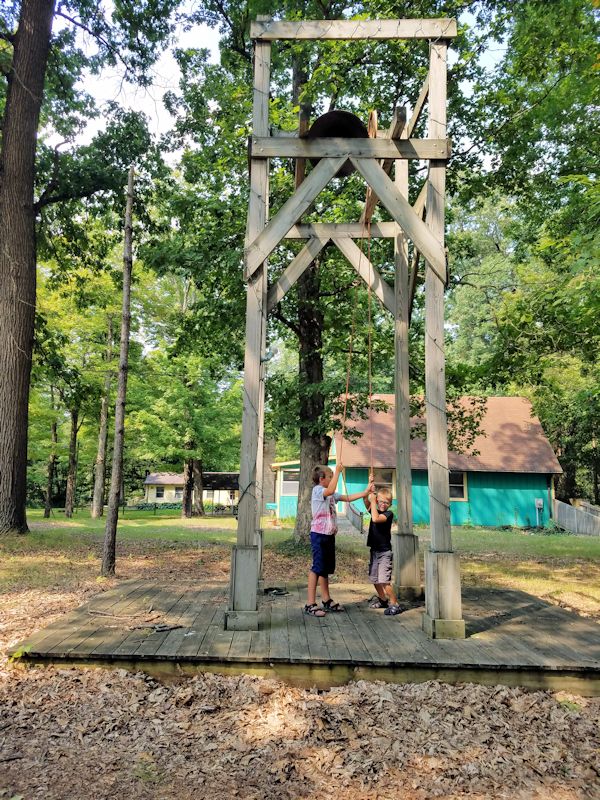
September 12, 2021 | DOWAGIAC, Michigan – Though the electricity was turned off in all buildings on the site, visitors arriving at Crystal Springs camp today were embraced by the sacred power of the place the moment they stepped out of their cars.
It was an afternoon when time stood still. One man stepped out into 1968, “I was three years old. I remember going to stay at the cottage with Grandpa and Grandma and swimming when the campers were not using the pool.” Another woman stepped back 11 years. “I got engaged at the canoe launch and then was married in the chapel in 2010.” The leap in time was greater for a pastor who recalled that the tabernacle, “the Methodists built in these woods in 1890 was a simple wooden structure, but its size hints at the vast numbers of souls it sheltered through the years.”
Those gathered for the decommissioning of the Crystal Springs Camp were greeted by the Rev. David Berkey, Executive Director of Michigan Area United Methodist Camping. He invited them to spend quiet time walking the grounds. Some headed for cottages they had helped to paint and maintain over the years. Others closed their eyes and “saw” structures, like the “old hotel,” that are no longer standing.
The tabernacle, described by a former resident and camper as “a 12,000 square foot barn lined with bleachers,” surely stood as the spiritual heart of the camp in days gone by. But many come more lately to the site found the springs to be the sacred center of it all.
Jeff Parsons, who served as director of Crystal Springs Camp from 2007-2011, noted, “Without a doubt, this is a very holy place. I will always remember the times down at the springs, putting my hands in that holy water.”
Karen Reese stood outside the chapel and recalled when she and her late husband, Jeff, ran mini-camps and family day camps with the people of Edwardsburg Hope UMC. “Our very first year, with all the hullabaloo of training and paperwork, we had our act together as much as we knew how to do.” As they approached the camp, their excitement turned to wonderment and joy as, “We turned and, as soon as we could see the camp, there in the beautiful, clear blue sky was a perfect dove-shaped cloud above the camp. We all went, ‘It’s going to be perfect! It’s going to be great!’” Karen adds she was first at Crystal Springs as a 13-year-old camper. “I accepted Christ here at the fire bowl.”
What camp taught me
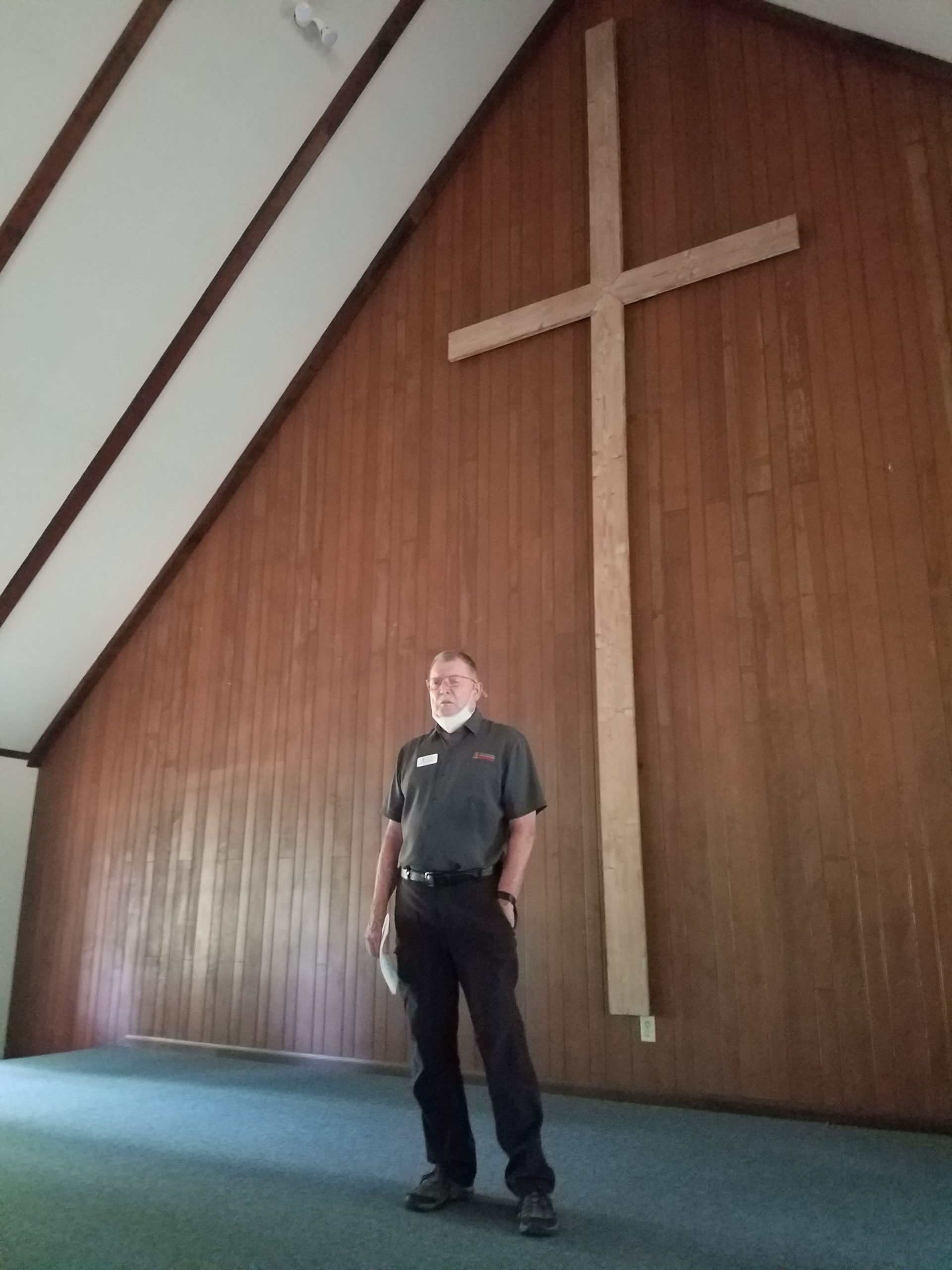
Once gathered in the chapel, Berkey introduced those present from The Michigan Conference: two representatives from the Camp Board, Michelle Hills and the Rev. Dwayne Bagley, Bishop David Bard, and Director of Connectional Ministries Paul Perez. Also present was Steve Winchester from the Pokagon Band of Potawatomi. Berkey thanked Winchester “for the Band’s willingness for us to be their guest today.”
In a statement made mid-August, Berkey explained, “From a justice standpoint, the MAUMC Board wanted to sell to the Pokagon Band. It was the right thing to do. Before Europeans settled here, all of Michigan was Native American land. We felt it was an important gesture toward restorative justice to return the land in this way.”
Camp songs were followed by a Native American prayer (United Methodist Hymnal No. 329) led by Rev. Bagley and a reading of Isaiah 65:17-25 by the Rev. Perez.
In moments of reflection, Berkey called himself a “child of camp and a child of God.” He recalled his experience with the YMCA Indian Guides father-son program. Berkey spoke of an afternoon in fifth grade at a Presbyterian camp in Ohio. “I was swimming the backstroke and looking up at the sky. It was then that I experienced God in a way that made me see God was real.” He acknowledged that those gathered in the Chapel “have that seed growing and flourishing in your life about camp. We recall and reconnect with that experience that introduced us to that transcendent God.”
Berkey stated that camp “gives us a sense of mission and justice.” He added that take-away from camp helped him understand, as an adult, how misguided it had been as a young camper to “appropriate Native American rituals that were not our own, as white suburbanites in Ohio.” He went on to say that “our decision to sell this camp to the tribe here is a small gesture to begin to change that injustice. It is a start that comes out of the faith that we learned at camp.”
His meditation concluded with an expression of sadness that the United Methodist Church could not retain ownership of Crystal Springs because of declining membership and increasing expenses. But he sounded a note of hope because the God he met while swimming as a youngster “is creating something new with this sacred place. Many life-giving things will happen here after we leave today,” Berkey asserted.
Memories shared
Berkey then gave those seated in the chapel the opportunity to share their experiences at Crystal Springs Camp and their thoughts about the value of Christian camping. Here is a sampling.
The Rev. Cindy Parsons, who lived on the campgrounds during the years her husband Jeff was director, offered some historical perspective. “The important thing about the camp meetings that happened here was the way they built up the local churches. People would make a first-time commitment, then go back home. That is what we need to recover in Christian camping. How do we build up the local church?”
“My dad was camp manager here 45 years ago,” said Michelle Hagans. “I represent the family today. We are happy to know that the camp is going back to where it belongs. Living near the tabernacle was like having the great pyramid of Giza in my own backyard! We have a lot we need to make right. The Tabernacle was built not long after the Trail of Tears.”
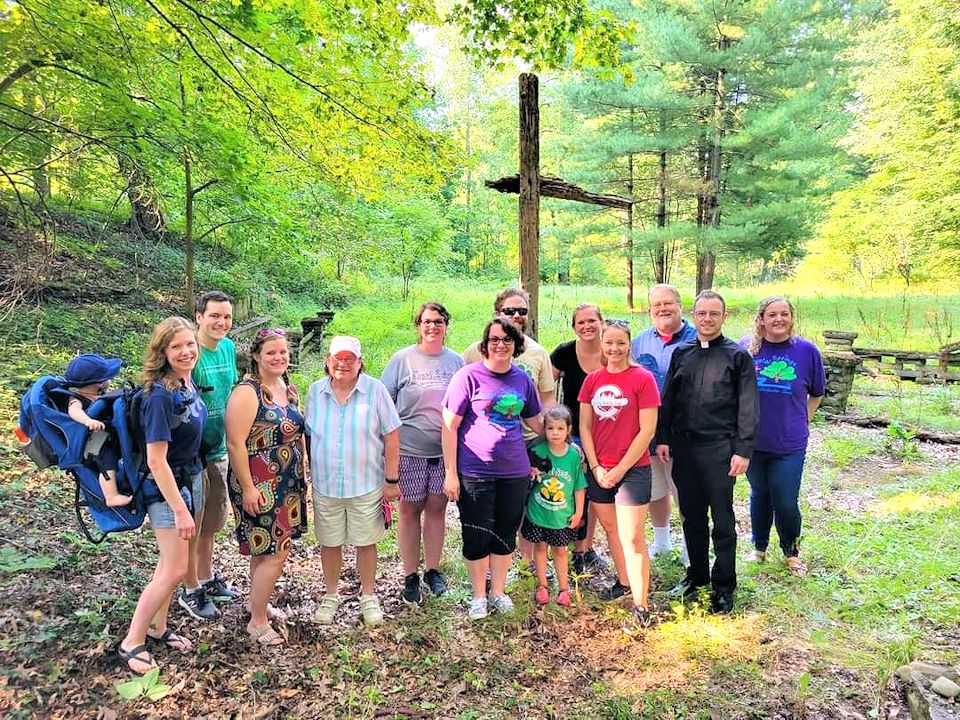
Many, like Diane Barrett Curtis, had long personal associations with the camp. “I was nine years old in 1960 and was in Choir Camp with Director Vivian Hartman. A storm came up during the Friday evening concert, and we lost power. My dad drove his car into the tabernacle so that Vivian could see the music and direct. Years later, Ken Medema was here at Crystal Springs. He heard that story and created a song called, Choir in the Dark.”
Makayla Long was another who first arrived as a camper and then returned as a young adult. “I started coming to Crystal Springs when I was six. One year, I went to camp here three weeks in a row. Later, I wanted to be on the staff, to become a role model. Was I assigned to do archery? No. ‘You are going to clean toilets.’ I worked here for six years, learning to do things like how to cook 300 pancakes in 30 minutes. I learned many practical things as a staffer.”
A number of persons talked of finding Christ around the fire bowl. The Rev. Lynn DeMoss reflected, “Camp is a deciding place. Whatever you came here for, you were confronted by things that made you decide. Is this your parents’ faith or YOUR faith? Crystal Springs will not stop being a deciding place just because it is not a United Methodist camp. People for years to come will experience this as a deciding place.”
With deep joy, comes profound sadness. Pam Cowgill expressed her grief. “I came here in 1966 as a camper and hated it. Then I was conned into being a counselor and fell in love with this place after seeing the kids’ love of Jesus and their spiritual growth from year to year. I was here for 45 years in some capacity, going through five or six directors. I was so angry when you closed Crystal Springs, but I am letting go of some of that. It broke my heart because of kids that will not know Jesus. I am glad it is sold to the Pokagon Band.”
A new beginning
Steven Winchester, a member of the Tribal Council of the Pokagon Band, greeted the assembly. He began, “BoZho (hello). Wabenose Steve Winchester, Walks in the Dawn, Thunder Clan, Bodwéwadmimwen (Potawatomi language). I speak this language on this land once again. Migwetch to The Creator (God) for bringing us together.”
Winchester continued, “We are here today to hear stories and share values. Whatever your belief system, we honor that. We believe in the freedom of religion, to stand anywhere to talk and listen. We are all here to develop a relationship between ourselves and the Creator.”
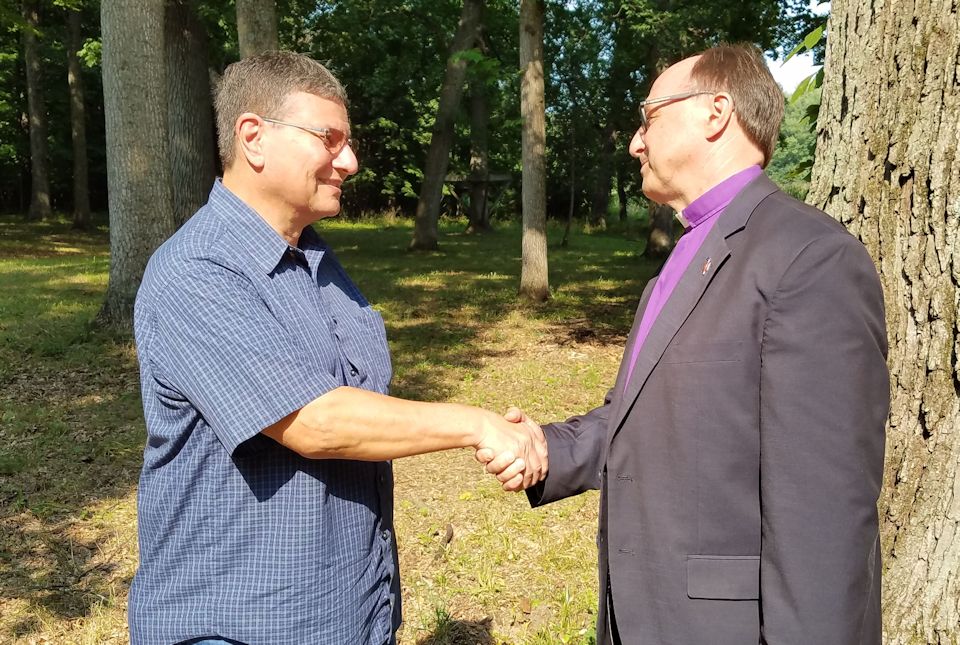
He thanked Michigan Area United Methodist Camping. “The Pokagon Band is moved and very grateful that we were reached out to about this camp.” Crystal Springs is adjacent to the Band’s land, where powwows are held and where the tribal headquarters is located. Winchester explained that the pandemic has slowed the planning for what happens next with the site. “We have elected a new council with a woman as its chair. I can say that this place will be used by the citizens.” He added that “Some buildings will likely be torn down and others built. We are not going to clear-cut all the trees. Our desire is to preserve the property.”
Bishop David Bard came forward acknowledging that “bishops sometimes need to do some heavy lifting and speak uncomfortable words.” He read the formal statement of deconsecration …
This camp, having been consecrated and named Crystal Springs Campground, the land on which it stands and all objects remaining in it, we now deconsecrate and release for any honorable use. We declare that it is no longer a place of meeting, growing, and camping for United Methodists.
Bishop Bard noted that “with deconsecration, the sacredness does not go away. It is now in the hands of people here before us, who will now use it well. It is sacred because of all the stories we heard today, of the way God touched your lives because you were at this camp. You are part of its sacredness.”
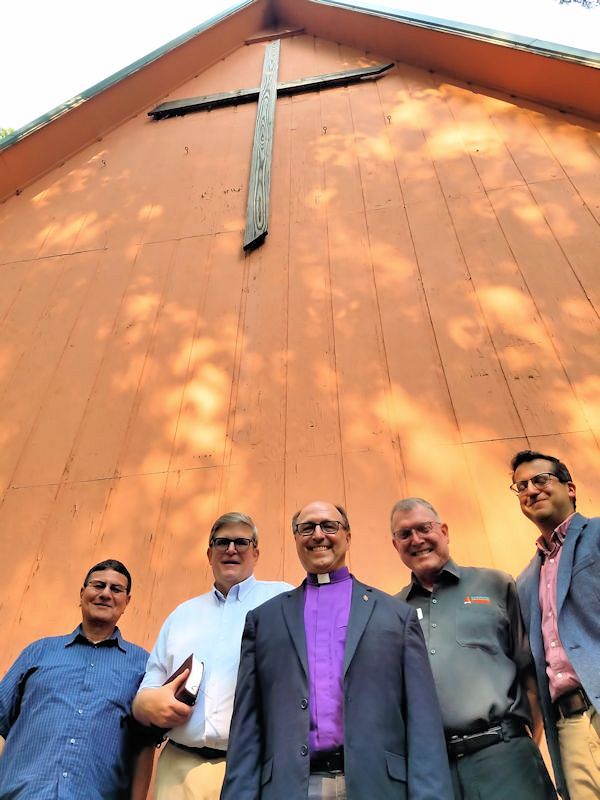
With that, 160 years of Methodist activity at Crystal Springs ended. At the time of its closing in 2019, Crystal Springs was the oldest religious camp in Michigan and the second oldest Methodist camp in the United States. The hope of Michigan Area United Methodist Camping is that the sale of Crystal Springs and other properties will provide new adventures and enhanced faith formation for campers visiting facilities at Lake Huron Retreat Center, Lake Michigan Camp & Retreat, and Wesley Woods Camp & Retreat. Learn more at www.umcamping.org.
Crystal Springs Camp will remain alive in the hearts and minds of all who invested a piece of themselves beneath those trees and near the bubbling water. People like the Rev. Chris Momany, who offered recollections before entering the Chapel. “I am here for a lot of reasons. I am from Benton Harbor, so this was our camp when I was an elementary-age person.” He went on, “When I was in seminary, working at Peace Temple United Methodist Church, I counseled here several times. I even helped take up the old wooden floor in the tabernacle. I was just a guy with a shovel, moving mud when they were pouring cement.” Momany concluded, “Yes, I’ve got a lot of history here. And now I’m the pastor in Dowagiac. For me, today is a lot of full-circle kind of stuff.”
From the website of the Pokagon Band of Potawatomi …
In 1836 … Leopold Pokagon returned to southwest Michigan. Leopold purchased land in Silver Creek township using annuity monies accrued through several treaty negotiations, including the Treaty of 1833. It was at this time that Pokagon and several other groups moved collectively to Silver Creek Township, near present-day Dowagiac, Michigan.
As the descendants of Leopold Pokagon make future plans for the place known as Crystal Springs, we’ve come full circle indeed.
Last Updated on December 8, 2023

